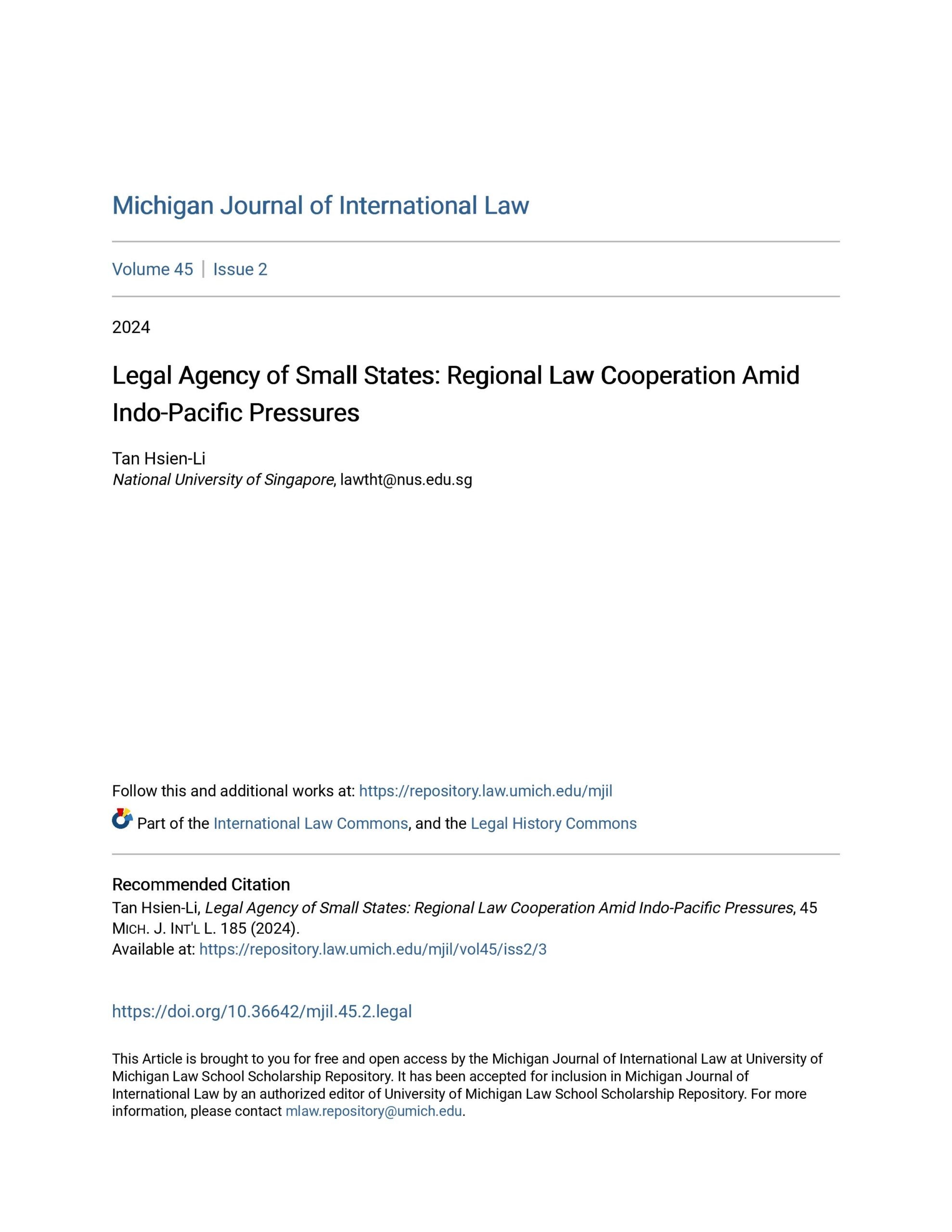
Legal Agency of Small States: Regional Law Co-operation amid Indo-Pacific Pressures
 Using the wealth of carefully curated data in the CIL Instruments Database, Dr Tan Hsien-Li has published “Legal Agency of Small States: Regional Law Co-operation amid Indo-Pacific Pressures” 45(2) Michigan Journal of International Law (Oct 2024) 185-232. The product of a decade of thinking and (re)writing, this article challenges the common narrative is that only Big Powers have the voice and the moves. More particularly, discussions about the Indo-Pacific contestation between China and the United States often focus on both superpowers’ geopolitical strategies and economic and military might. The experiences of small and less powerful Indo-Pacific states navigating these tensions are relatively overlooked or even discounted. Yet, they are not passive bystanders in their longstanding neighbourhood drama— they often seek strength in unity via their regional organizations and produce regional law to safeguard their collective interests. In short, they exercise legal agency. Using empirical, historical, and cross-disciplinary (int'l law and int'l relations) analyses, and mining the CIL-NUS Instruments Database of ASEAN laws (from establishment to date), this article examines ASEAN’s experience of regional law cooperation to navigate challenges (including, but not limited to, the U.S.-China contestation), to conceptualize how small Indo-Pacific states have exercised legal agency amid geopolitical pressures to safeguard common security and economic interests. This has resulted in the exercise of legal agency corresponding to three distinct geopolitical environments: via realist rhetoric laws in the Cold War, constructivist cooperation laws amid globalization, and rules-based ordering in the contemporary Indo-Pacific. ASEAN’s experience may have generalizable lessons for how other Indo-Pacific or Global South regimes facing geopolitical pressures exercise their legal agency. https://repository.law.umich.edu/mjil/vol45/iss2/3/
Using the wealth of carefully curated data in the CIL Instruments Database, Dr Tan Hsien-Li has published “Legal Agency of Small States: Regional Law Co-operation amid Indo-Pacific Pressures” 45(2) Michigan Journal of International Law (Oct 2024) 185-232. The product of a decade of thinking and (re)writing, this article challenges the common narrative is that only Big Powers have the voice and the moves. More particularly, discussions about the Indo-Pacific contestation between China and the United States often focus on both superpowers’ geopolitical strategies and economic and military might. The experiences of small and less powerful Indo-Pacific states navigating these tensions are relatively overlooked or even discounted. Yet, they are not passive bystanders in their longstanding neighbourhood drama— they often seek strength in unity via their regional organizations and produce regional law to safeguard their collective interests. In short, they exercise legal agency. Using empirical, historical, and cross-disciplinary (int'l law and int'l relations) analyses, and mining the CIL-NUS Instruments Database of ASEAN laws (from establishment to date), this article examines ASEAN’s experience of regional law cooperation to navigate challenges (including, but not limited to, the U.S.-China contestation), to conceptualize how small Indo-Pacific states have exercised legal agency amid geopolitical pressures to safeguard common security and economic interests. This has resulted in the exercise of legal agency corresponding to three distinct geopolitical environments: via realist rhetoric laws in the Cold War, constructivist cooperation laws amid globalization, and rules-based ordering in the contemporary Indo-Pacific. ASEAN’s experience may have generalizable lessons for how other Indo-Pacific or Global South regimes facing geopolitical pressures exercise their legal agency. https://repository.law.umich.edu/mjil/vol45/iss2/3/

